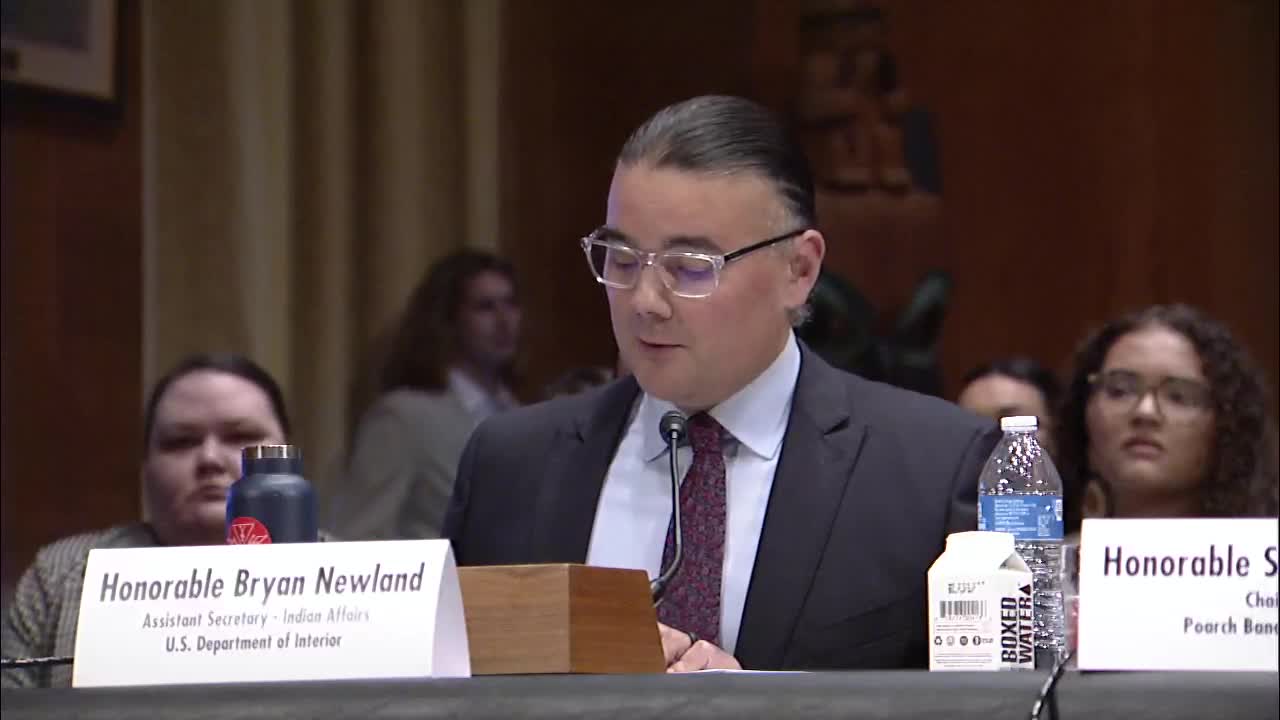Tribes push for vital water rights and infrastructure reforms
June 12, 2024 | Indian Affairs: Senate Committee, Standing Committees - House & Senate, Congressional Hearings Compilation

This article was created by AI summarizing key points discussed. AI makes mistakes, so for full details and context, please refer to the video of the full meeting. Please report any errors so we can fix them. Report an error »

In a recent government meeting, discussions centered on two significant legislative proposals aimed at enhancing water rights and resources for tribal communities.
The first proposal, S 4442, seeks to amend the Crow Water Rights Settlement Act of 2010. This bill aims to establish a non-trust fund account that would enable the Bureau of Reclamation to continue rehabilitation efforts on the Crow Irrigation Project. Additionally, it proposes the creation of a new municipal, rural, and industrial (MRNI) project trust fund specifically for the Crow Tribe. The administration emphasized the importance of water as a sacred resource, crucial for public health and economic development in tribal areas.
Notably, S 4442 does not increase funding for the existing settlement act but modifies how funds are managed. The bill would allow for the establishment of a non-trust interest-bearing account within the Treasury, facilitating the accrual of interest on appropriated funds during project planning and construction phases. Furthermore, it would transition the MRNI portion of the settlement from an infrastructure-based to a trust fund-based settlement, allowing the tribe to utilize these funds for various projects, including wastewater treatment facilities and land purchases with water rights. The bill also extends the Crow Tribe's exclusive rights to develop hydropower at the Yellowtail Afterbay Dam until 2030.
The second significant discussion involved the Porch Band of Creek Indians Parity Act, presented by Stephanie Bridal, the tribe's chair and CEO. This legislation aims to clarify that the Indian Reorganization Act applies to all federally recognized tribes, a move supported by the Porch Band as part of a broader advocacy for tribal rights. The tribe expressed its full support for Senate Bill 563, which aligns with their goals for equitable treatment under federal law.
Both legislative efforts underscore the ongoing commitment to addressing the unique needs and rights of tribal communities, particularly concerning water resources and federal recognition. The administration has pledged technical assistance to support these initiatives as they progress through the legislative process.
The first proposal, S 4442, seeks to amend the Crow Water Rights Settlement Act of 2010. This bill aims to establish a non-trust fund account that would enable the Bureau of Reclamation to continue rehabilitation efforts on the Crow Irrigation Project. Additionally, it proposes the creation of a new municipal, rural, and industrial (MRNI) project trust fund specifically for the Crow Tribe. The administration emphasized the importance of water as a sacred resource, crucial for public health and economic development in tribal areas.
Notably, S 4442 does not increase funding for the existing settlement act but modifies how funds are managed. The bill would allow for the establishment of a non-trust interest-bearing account within the Treasury, facilitating the accrual of interest on appropriated funds during project planning and construction phases. Furthermore, it would transition the MRNI portion of the settlement from an infrastructure-based to a trust fund-based settlement, allowing the tribe to utilize these funds for various projects, including wastewater treatment facilities and land purchases with water rights. The bill also extends the Crow Tribe's exclusive rights to develop hydropower at the Yellowtail Afterbay Dam until 2030.
The second significant discussion involved the Porch Band of Creek Indians Parity Act, presented by Stephanie Bridal, the tribe's chair and CEO. This legislation aims to clarify that the Indian Reorganization Act applies to all federally recognized tribes, a move supported by the Porch Band as part of a broader advocacy for tribal rights. The tribe expressed its full support for Senate Bill 563, which aligns with their goals for equitable treatment under federal law.
Both legislative efforts underscore the ongoing commitment to addressing the unique needs and rights of tribal communities, particularly concerning water resources and federal recognition. The administration has pledged technical assistance to support these initiatives as they progress through the legislative process.
View full meeting
This article is based on a recent meeting—watch the full video and explore the complete transcript for deeper insights into the discussion.
View full meeting